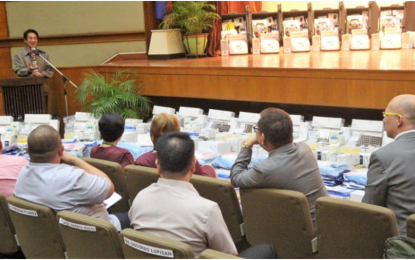
OUTBREAK MONITORING KITS. Department of Health-Calabarzon Regional Director Eduardo C. Janairo (at the podium) stresses the importance of the portable laboratory kits given by the ASEAN-Canada Global Partnership Program in the health and outbreak monitoring in the provinces of Cavite, Laguna, Batangas, Rizal, and Quezon. He thanked Canadian Embassy representatives for their support at the turnover of the field lab kits at the Research Institute for Tropical Medicine (RITM) compound in Alabang, Muntinlupa City on Aug. 29, 2018. (Photo courtesy of DOH 4-A)
CALAMBA CITY, Laguna -- The Department of Health (DOH) Calabarzon Regional Office is one of the recipients of portable laboratory kits for disease outbreak monitoring from the ASEAN-Canada Global Partnership Program (GPP).
Aside from Calabarzon, 16 other Regional Epidemiology and Surveillance Units (RESUs) across the country received kits at the Research Institute for Tropical Medicine (RITM) complex in Alabang, Muntinlupa City on Aug. 29.
“This lab kit will ensure the proper collection, packaging, and transport while observing biosafety in the field and enhancing data collection and reporting an outbreak. It can also be used in strengthening surveillance systems which can detect bio threat events for public health of international concern,” DOH-Calabarzon Regional Director Eduardo C. Janairo said over the weekend.
Janairo said the portable lab kit will come in handy in the event of a possible disease outbreak for disease monitoring and surveillance in the provinces of Cavite, Laguna, Batangas, Rizal, and Quezon.
“With this equipment, our epidemiologists can now provide early detection, confirmation, and prevention of deadly pathogens, including the development of laboratory tests and treatment and management of patients within the area of concern, without sending the laboratory samples to RITM and waiting for results,” he said.
Glen S. Ramos, DOH Calabarzon media relations and communications unit (MRCU) officer, said the DOH had distributed kits to RESUs, Epidemiology Bureaus, Field Epidemiology Training Program (FETP) graduates, and selected provincial and city epidemiology and surveillance units across the Philippines.
Ramos said the lab kits were funded by the ASEAN-Canada global partnership under the program called “Strengthening Response Capabilities for Emerging and Re-Emerging Diseases.”
The partnership program includes building a national laboratory for emerging dangerous pathogen, improving outbreak investigation capacity of the DOH's national and regional epidemiology and surveillance units, and improving RITM's capacity to respond to biological threats in the communities.
Ramos said the field test kit includes rapid diagnostic tests (RDT) for dengue and viral hepatitis for a “quick and easy” preliminary or emergency medical screening or diagnosis.
He added the field test kit also has some entomological equipment, such as aspirator and flashlight, for indoor and outdoor mosquito collection, droppers, strainer tray, and funnel net for wells, ladle, bottles to keep larvae, and vector dissection equipment.
Ramos said the portable laboratory kit also has specimen collection supplies, such as blood culture bottles, Cary Blair medium/Stuarts transport medium, disposable storage vials and syringes, glass slides and cover slips, gloves, labels-specimen address, masks, disposable pipette, scalpel/blade, spatula, forceps, loop holder, sharps disposal container, scissors, sleeping bag, outdoor gear, stationery, test tube racks, throat swabs, tourniquet with clip, universal transport media, vacutainer with EDTA, portable digital centrifuge and centrifuge tubes.
For testing, the kit has adhesive tapes, alcohol swabs/bottles, android tablets with GIS, biohazard bags, calculator, flashlight with rechargeable batteries, blood glucose monitoring kit, BP apparatus, digital thermometer, digital camera, hand sanitizer, personal protective equipment, povidone iodine, portable printer, portable projector, smart watch with GPS, power banks, rechargeable lamps, rubber bands, spirit lamp/gas lighter, sterile stool container, trunk and smaller tool box, vaccine carrier with ice-packs, Ziploc plastic bags, matches, OMNI extension cord, pelican large case, plastic petridish, sealing film, 64GB digital card, 16GB Flash Drive, ZTE Pocket Wi-Fi Kit, and windbreaker.
“It is complemented with essential forms and reference documents used for investigation and incident reporting,” Ramos added. (PNA)
